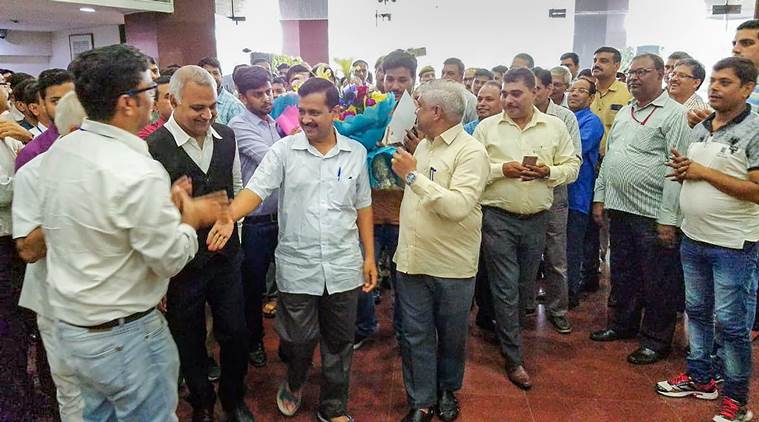 Arvind Kejriwal at the Delhi Secretariat on Wednesday. (Source: Twitter)
Arvind Kejriwal at the Delhi Secretariat on Wednesday. (Source: Twitter)
The Supreme Court verdict on Wednesday did not explicitly delve into the last legal flashpoint between the AAP government in Delhi and the BJP-led Central government over matters pertaining to “services”, which involves creation of posts. The court made it clear that the Delhi Cabinet is empowered with those subjects for which the Assembly has legislative power.
The order effectively gives the upper hand to the AAP government on the subject of services. The court made it clear that the executive power of the Government of National Capital Territory of Delhi (GNCTD) is “co-extensive” with the legislative power of the Delhi Assembly, which is envisaged in the Constitution and which “extends over all but three subjects in state list and all subjects in the concurrent list.”
The observation effectively means that executive power of the Delhi government is coterminous with legislative power of the Delhi Assembly, which extends over all subjects in the state list and concurrent list barring the three reserved subjects. It also means that provisions of Constitution empowers executive power on the Council of Ministers over all subjects for which the Delhi Assembly has legislative power.
More importantly, the Supreme Court has made it clear that the provisions of Constitution “reserves the Parliament’s legislative power on all matters in the state list and concurrent list, but nowhere reserves the executive powers of the Union with respect to such matters”.
The observation by the Constitution bench effectively means that while Parliament exclusively has the legislative power on all matter in state and concurrent lists, the same is not extended to the Central government.
In April, the General Administration Department of GNCTD had cancelled the order of appointment of nine advisers to ministries, citing an order by the Union Ministry of Home Affairs. The GAD had said that a May 21, 2015 notification of the MHA “clarifies that ‘services’ under GNCTD, which included creation of services/posts, is (a) subject reserved for central government as per the Constitution.”
The Delhi High Court had earlier upheld the MHA order. The High Court order practically dis-empowered Delhi government on issues of appointments even in subject matters duly within the remit of the state government. The AAP government has been crying foul, suggesting that the verdict had a chilling affect on its powers since it granted an upper hand to the L-G in the state bureaucracy.
The court made it clear that the executive power of the Central government over the National Capital Territory (NCT) of Delhi is “confined to three matters”: public order, police and land.
Chief Justice of India Dipak Misra has said, “A conjoint reading of Article 239AA (3) (a) and Article 239AA(4) reveals that the executive power of the Government of NCT of Delhi is coextensive with the legislative power of the Delhi Legislative Assembly which is envisaged in Article 239AA(3) and which extends over all but three subjects in the State List and all subjects in the Concurrent List and, thus, Article 239AA(4) confers executive power on the Council of Ministers over all those subjects for which the Delhi Legislative Assembly has legislative power.”